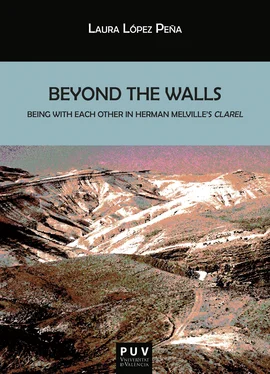Laura López Peña - Beyond the Walls.
Здесь есть возможность читать онлайн «Laura López Peña - Beyond the Walls.» — ознакомительный отрывок электронной книги совершенно бесплатно, а после прочтения отрывка купить полную версию. В некоторых случаях можно слушать аудио, скачать через торрент в формате fb2 и присутствует краткое содержание. Жанр: unrecognised, на английском языке. Описание произведения, (предисловие) а так же отзывы посетителей доступны на портале библиотеки ЛибКат.
- Название:Beyond the Walls.
- Автор:
- Жанр:
- Год:неизвестен
- ISBN:нет данных
- Рейтинг книги:3 / 5. Голосов: 1
-
Избранное:Добавить в избранное
- Отзывы:
-
Ваша оценка:
- 60
- 1
- 2
- 3
- 4
- 5
Beyond the Walls.: краткое содержание, описание и аннотация
Предлагаем к чтению аннотацию, описание, краткое содержание или предисловие (зависит от того, что написал сам автор книги «Beyond the Walls.»). Если вы не нашли необходимую информацию о книге — напишите в комментариях, мы постараемся отыскать её.
Beyond the Walls. — читать онлайн ознакомительный отрывок
Ниже представлен текст книги, разбитый по страницам. Система сохранения места последней прочитанной страницы, позволяет с удобством читать онлайн бесплатно книгу «Beyond the Walls.», без необходимости каждый раз заново искать на чём Вы остановились. Поставьте закладку, и сможете в любой момент перейти на страницу, на которой закончили чтение.
Интервал:
Закладка:
López has chosen one of Melville’s longest and least read works as the prism for examining the literary politics of his intersubjective universalism. Clarel: A Poem and Pilgrimage in the Holy Land was published in New York by Harpers in 1876, the year in which the United States celebrated its centennial. Clarel is comprised of over 17,000 lines of verse, making it one of the longest poems in the English language. However, in an age that craved the short lyric and invented shorthand, Melville’s strenuous pilgrimage in poetry was ignored. Less than three years after Clarel ’s only printing of 350 copies, Melville gave permission for 224 of them to be pulped by his publisher. To Harvard professor Lawrence Buell the poem remains “the great white elephant, the great unread […] among all the major works of all the canonical nineteenth-century English-language authors”. 2 American writer and poet Robert Penn Warren acutely called it “a seismograph that no one looked at”. 3
López’s careful examination of Clarel releases it from the “dead letter” walls of isolation that have impeded readers from accessing its artistic wisdom. Beyond the Walls thus contributes to the important process of resurrecting Melville’s career as a major poet, which lasted three times the length of the period in which he wrote his fiction, from “the pall of incomprehension” that Willard Thorp diagnosed in 1938 and under which his artistic achievements in verse have remained occluded for far too long. 4 Her book reveals the biographical and historical circumstances that led to the composition of his opus in verse. López charts the twenty years of Melville’s career and literary production from his own journey to the Holy Land in 1856-7, following his completion of his last novel, to the publication of his poetic meditation on that journey in 1876. During that time he transformed himself into a poet, endured the national destruction of the Civil War, and accepted a job as a Customs Officer in New York City where he worked gathering revenue as an outdoor surveyor discharging cargo on the docks. While Melville was engaged in the compositional rigors of his poetic pilgrimage, he lived his daily life on the front line of the expansion of American capitalism, where he experienced both the burgeoning vigors of commerce as well as the squalid corruptions of greed, graft, and speculation. When Melville was walking to and from the wharves of Manhattan his creative mind was populating the Holy Land with a symposium of human characters for a circular pilgrimage together of descent and return that ends in loss and separation.
Beyond the Walls also offers original commentary on Melville’s prior book of Civil War poetry named Battle-Pieces , intersperses illuminating commentary from her thorough knowledge of Melville’s oeuvre, and engages in a dialogue with other scholars who have grappled with the artistic accomplishment of Clarel . One of the most original aspects of Beyond the Walls is López’s alignment of Melville’s themes with the transnational eclipse of democratic promise during the years of Reconstruction and the emergence of the “Gilded Age”. Melville transposes the social divisions within the United States along with European habits of imperialism and tyranny onto the Holy Land, which becomes localized as the symbolic stage for his meditations on the human drama he documents in Clarel of “the arrest of hope’s advance”.
Melville’s poem transcribes the tragic divide between the potential of intersubjective universalism and the actuality of human estrangement as partisanship divides communities and religious practice strays from its ethical core. Melville tests the integrity of his characters by dramatizing their lost opportunities to choose connection over convention and by honoring their fortitude to endure with neither reward nor certitude. The careful discipline of Melville’s metrical pilgrimage leads ultimately to the lesson that words cannot embody or replace the truths they hope to communicate, and instead form Babel-like partitions that piece humans apart and silence their conversations. Out of the loneliness of human suffering emerges a shared consolation, manifest within Melville’s art, through the voicing of an existential anguish that López calls a “universal existential wail” that evokes what Alphonso Lingis calls “the murmur of the world”. 5 Melville challenges his readers to confront the sad and shared wisdom that “naught else abides on fickle earth but unkept promises of joy”. 6
Beyond the Walls serves as a compelling introduction to the panoply of themes and characters in Clarel and the heritage of critical scholarship assessing its accomplishment. Newton Arvin celebrated Clarel ’s “crowdedness of social landscape”, claiming that “[n]owhere else, not even in Moby-Dick does Melville fill the stage more populously, […] or succeed more brilliantly in giving vitality to secondary and even to incidental figures”. 7 These characters include such diverse figures as a black Jew from southern India, an Albanian Muslim mercenary, a disillusioned Swedish idealist, a Jewish geologist, a Confederate veteran descended from Indians and Catholics, a Yankee convert to Zionism, and the only character given a full name: Señor Don Hannibal Rohon del Aquaviva, who lost a leg and an arm fighting in Mexico. López shows the restless but convivial American skeptic named Rolfe, a “messmate of the elements”, to be most representative of Melville’s philosophy of “manysidedness”. Rolfe embodies how the refractions of Melville’s polyphonic poetic voice musters a multifaceted meditation on human vagaries throughout the circuit of its “pilgrimage”. The genius of humanity is registered by practicing a genial forbearance that acknowledges an interiority to others while realizing that, though it cannot be seen, it but must be respected at the cost of being blind.
López shows Melville’s works and poetry, in particular Clarel , to be an ethical testing ground—between literary characters as well as between author and reader—that she calls “a space of political and ethical (im)probabilities”. The loquacity and persistence of Melville’s own literary voice, even when framed in the form of poetic verse, embodied his hope that diversity can be sustained in dialogue. However, the rigor of his poetic meter also challenges the reader’s access to its philosophical deliberations. Her study reveals Melville to be a sophisticated contemplator of political ethics in his dramatization that the creativity that connects people with each other in sustaining ways also figures forth the imagined fantasies through which their hopes for communion are frustrated.
The failure of Clarel to earn the readers it deserves is one measure of its aborted potentiality. Melville himself consigned Clarel to oblivion, claiming that it was “eminently adapted for unpopularity”, and it has repulsed or estranged audiences over the years. 8 The fact that a young Spanish female scholar in the twenty-first century so intimately reengages this neglected poem by a nineteenth-century American male author is itself a tribute to the intersubjectivity of Melville’s universalist art. Beyond the Walls is also testimony to López’s own responsive struggle as a reader to surmount the silence of distance and remain open to the invitation of Melville’s verse and the human wisdom it communicates. López’s capacious sensitivity to the ways that Melville’s words invite empathic relations transacts the potential she finds at the core of its expressive labors. Her own writing carries forward this ethical responsibility to its readers as an integral part of its intellectual charge. The insurmountable challenge to the heart is to not become entranced by the dictates of culture so as to remain capable of being moved by feeling the call to join together across the chasms of conventions and of words.
Читать дальшеИнтервал:
Закладка:
Похожие книги на «Beyond the Walls.»
Представляем Вашему вниманию похожие книги на «Beyond the Walls.» списком для выбора. Мы отобрали схожую по названию и смыслу литературу в надежде предоставить читателям больше вариантов отыскать новые, интересные, ещё непрочитанные произведения.
Обсуждение, отзывы о книге «Beyond the Walls.» и просто собственные мнения читателей. Оставьте ваши комментарии, напишите, что Вы думаете о произведении, его смысле или главных героях. Укажите что конкретно понравилось, а что нет, и почему Вы так считаете.










